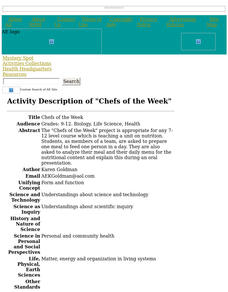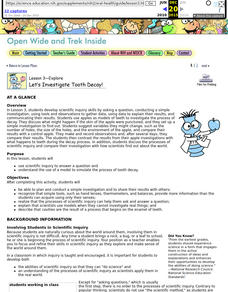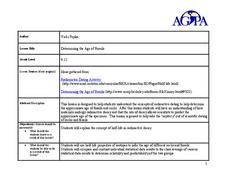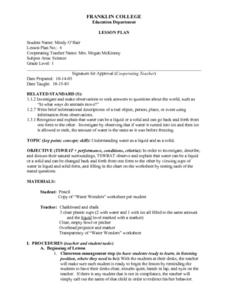Curated OER
Galactic Inquiry
Students view NASA images of galaxies and develop a galaxy classification scheme. They compare and contrast their classification scheme with that developed by Edwin Hubble. They recognize that galaxies are collections of billions of stars.
Curated OER
Bouncing Light
Students design an experiment to investigate how light reflects. In this physics lesson, students apply the scientific method in conducting the experiment. They collect data and formulate a conclusion.
Curated OER
Steps To An Inquiry Process
Fourth graders investigate the research process. The finding of information about the indian tribes of Montana provides the context for student practice. They identify the problem and generate questions to find answers. The main...
Curated OER
Apply Technological Design and Scientific Habits of Mind
High schoolers work together to brainstorm their obstacles in testing different scientific principles. In groups, they are given a scenerio with a specific dilemma and they use the internet to research how to solve the problem. They...
Curated OER
Chefs of the Week
Students, as members of a team, are asked to prepare one meal to feed one person in a day. They analyze their meal and their daily menu for the nutritional content and explain this during an oral presentation.
Curated OER
You Light Up My Life: Developing a Scientific Theory for What Fuels a Candle's Flame!
Students examine how candles work and how scientific theories are developed and tested. Students propose hypotheses about what is burning in a candle then perform tests in order to develop their scientific theory. After a teacher...
Curated OER
Inquiry Lesson About Color
Pupils investigate the color choices artists make in their work, and to practice the scientific process of predicting, observing, inferring, and interpreting. This lesson's purpose is to prepare students for a museum visit.
Curated OER
Let's Investigate Tooth Decay
Students conduct a simple investigation to explore tooth decay.
Curated OER
Using Inspiration To Support Logical Reasoning
Students share descriptions of science experiments they have conducted. They create a thin film on the surface of water in order to float light objects and observe that a paper clip does, indeed, float on the surface of the water at...
Curated OER
Determining the Age of Fossils
Students examine the concept of radioactive dating. In this radioactive dating activity, students investigate how to determine the ages of fossils and rocks as they learn about half-life radioactive decay.
Curated OER
Species Interactions
Students study the scientific concepts of biodiversity and conservation through the use of basic equations of population growth and hands-on experiments/simulations. The lesson includes a take-home assignment which can be used for final...
Curated OER
Making Marbles
Students perform a simulation in which they work for a toy company and have to figure out how many marbles of different sizes can be made with the provided material. They must design their own experiment to figure this out.
Curated OER
Temperature School
Students observ the cooling and warming of room temperature, hot, and ice cold cans of water by measuring the change in temperature over time. They then attempt to develop explanations for the observations made and apply their findings...
Curated OER
Balls and Ramp
Students role several balls of different weights down a ramp and into a paper cup and record how far each ball made the paper cup move. They then answer questions that help them analyze their results and reinforce the idea that energy...
Curated OER
Plastic Wrap
Young scholars compare the price and quality of different kinds of plastic kitchen wraps and then rank them from best to worst. They take into account how well it comes out of the roll, if it seals well, it is tangles, how much weight...
Curated OER
What Is The Matter?
Students engage in a activity about the scientific concept of matter. They use essential questions in order to guide the research process. Students engage in several class inquiries that are hands on in order to investigate the...
Curated OER
Water - Solid and Liquid
First graders conduct a science inquiry by comparing water in its liquid and solid form. The students describe the different stages of water and complete a worksheet answering questions about each form of the water. Teacher assessment...
Curated OER
Three D Constellations
Young scholars are introduced to both celestial coordinates and to the first rung on the distance determination ladder. They convert spherical coordinates to Cartesian coordinates to construct a three dimensional model of a...
Curated OER
Chemical Changes
Students explore chemical changes. in this instructional activity about the properties of chemical changes, students do experiments, observe, and record results. Students complete four experiments in order to observe chemical changes. In...
Polar Trec
Down to the Deep Virtual Lab
At a depth of 3,000 m in the ocean, the pressure is 300 times that at sea level! In the activity, individuals predict what will happen to Styrofoam cups submerged 3,000 meters into the ocean. They then convert these units to soccer...
NASA
Determining the Nature, Size, and Age of the Universe
Prompt scholars to discover the expansion of the universe themselves. Using photographs of other galaxies, they measure and then graph the size and distance of each. Finally, they draw conclusions and prove the universe is...
Newspaper Association of America
Cereal Bowl Science and Other Investigations with the Newspaper
What do cereal, fog, and space shuttles have to do with newspapers? A collection of science investigations encourage critical thinking using connections to the various parts of the newspaper. Activities range from building origami seed...
Curated OER
Population Biology Case Study
Learners are focused on the big question: What makes a population grow and how could that growth stop? They use these concepts to help answer the big question: carry capacity, density dependent v. density, independent factors, predation...
Curated OER
Deformed Frogs! - The Parasite Hypothesis
This project provides students the opportunity to investigate parasites as a possible cause of the observed frog deformities. It asks students to view web-based evidence and interpret whether it supports the parasite hypothesis. Students...
Other popular searches
- Scientific Inquiry Lesson
- Scientific Inquiry Skills
- Scientific Inquiry Method
- Scientific Inquiry Health
- Scientific Inquiry Model
- Scientific Inquiry Process
- Scientific Inquiry Lab
- Scientific Inquiry Music
- Scientific Inquiry Questions
- Scientific Inquiry + Health
- Scientific Inquiry Experiments
- Scientific Inquiry and Design























